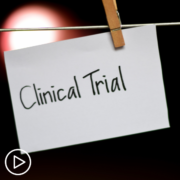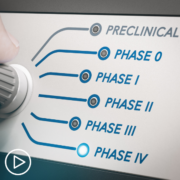Understanding Clinical Trial Phases
Understanding Clinical Trial Phases from Patient Empowerment Network on Vimeo.
What happens in each phase of a clinical trial? Dr. Ruben Mesa explains the structure of clinical trials and what MPN patients can expect when participating in a trial.
Dr. Ruben Mesa is an international expert in the research and care of patients with myeloproliferative neoplasms (MPNs). He serves as executive director of UT Health San Antonio MD Anderson Cancer Center in San Antonio, Texas. More about this expert, here.
See More From MPN Clinical Trials 201
Related Programs:

|

|

|
Transcript:
Katherine:
What is a clinical trial? Let’s start with that.
Dr. Mesa:
It’s a very good question. A clinical trial is a very structured way for us to be able to ask a question, whether that question is, is a new therapy safe?
Is it effective for a particular disease? Sometimes there are clinical trials that don’t involve treatments, that involve questionnaires, or other interventions, things like exercise or yoga or other things. But in general, it’s where we are having a patient do something in a structured way that we are able to then assess. Is it safe and is it effective? Is it reaching our goal in terms of trying to have an impact on that disease, whatever that is?
So, if it’s a blood pressure medicine, it’s probably about lowering the blood pressure. If it was about the COVID vaccines, did the vaccines help people from developing COVID or make COVID less severe? So, what they’re testing is variable. But the concept is the same.
It’s a very organized way for patients to be able to receive something that is closely monitored, that has been approved in advance as being a reasonable, safe, and ethical to ask patients to participate.
Katherine:
What are the phases of clinical trials?
Dr. Mesa:
So, the phases are particularly to treatment or drug use trials for developing new therapies. And they start with Phase I, which is typically the first time a drug is tested in human beings. It’s already gone testing in the lab to see whether it should work. It likely has had some animal testing to get a sense of dose and safety. But then, the first individuals who receive the drug, it’s on Phase I. What we’re really trying to understand the safety of the drug and to try to get around the dose.
There is the Phase II, typically where we’re testing a therapy in a group of people that are all similar to see what is the effectiveness of the treatment.
So, that first phase is, is the drug safe? What is the dose? The second phase is, is the drug effective? and however we define effective for that particular disease. And then, the third phase is where that new treatment is compared against how we otherwise normally would have treated the disease. So, if that’s in the setting of where we already have a drug that is approved, it’ll be compared against that drug.
If there’s never been a drug, then that comparator could possibly be a placebo, or an inactive part, or observation, or sometimes best alternative therapy the doctors can use.
There is, finally, a fourth phase. There are times that, after a drug is approved, the FDA will ask for additional information – safety information, effectiveness information – even after approval, and that’s something referred to as the fourth phase.










